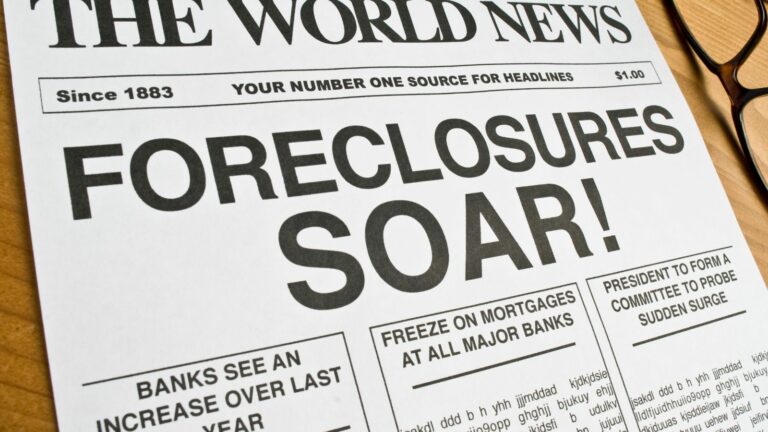Foreclosure is a term that often strikes fear into the hearts of homeowners. Financial struggles, the potential loss of a cherished home, and the overarching uncertainty can be daunting. Amidst these challenges, many homeowners ponder a crucial question: Can a home in foreclosure be sold? Delving into this query can offer insights and guidance for those navigating the complex terrain of foreclosure.

Understanding the Foreclosure Landscape
Foreclosure refers to the legal procedure in which a lender seeks to retrieve the outstanding loan balance from a borrower who has quit making the required payments. This recovery typically involves forcing the sale of the home used as collateral for the loan. For homeowners, this journey starts with missed payments and can end in the distressing loss of their property, often through an auction. Beyond the tangible loss of the house, foreclosure can inflict lasting damage on credit scores, complicating future financial endeavors.
Amid such adversity, certain opportunities arise. A pressing concern for many homeowners is the possibility of selling a property even as it teeters on the brink of foreclosure. This query goes beyond financial considerations, encompassing notions of agency, autonomy, and charting a path forward amidst challenges. Exploring the intricacies of foreclosure uncovers avenues available to homeowners. It highlights potential bright spots that can emerge from a seemingly dark situation.
A Deeper Dive into Foreclosure
Foreclosure might sound like a singular event, but it’s a multi-stage process that unfolds over time. Each stage has its challenges and implications for homeowners but understanding them can provide clarity and potentially open doors to solutions.
The Genesis: Missed Payments
Financial difficulty is at the heart of every foreclosure, leading to missed mortgage payments. These missed payments serve as the initial triggers for the entire foreclosure process. Typically, lenders give a grace period once a homeowner misses a payment, and this period varies based on the loan agreement and local regulations. If the homeowner doesn’t pay within this grace period, they could receive a late notice, and additional fees might accrue.
The Warning Phase: Pre-Foreclosure Notice
After several missed payments, usually around 90 days in arrears, the lender might initiate the pre-foreclosure phase. This phase begins when the lender files a public notice with the local courts, often called a “Notice of Default” or “Lis Pendens,” based on the state’s foreclosure procedures. The lender then officially alerts the homeowner, indicating their intention to foreclose if the homeowner doesn’t settle the defaulted loan. This period offers a window of opportunity. With the right approach, homeowners can negotiate a loan modification, apply for a forbearance, or sell the property.

The Climax: Auction
If the loan remains unpaid after the pre-foreclosure notice and any grace periods provided, the lender will typically schedule the home for auction. At this auction, the highest bidder buys the property; sometimes, if no higher bids come in, that bidder can be the lender. It’s worth noting that auctions are cash sales, meaning potential buyers must have the funds readily available.
The Final Stage: Post-Foreclosure (Bank-Owned Property)
Should the home not sell at auction, it becomes a bank-owned property or real estate-owned (REO). At this juncture, the lender assumes full property ownership and often seeks to sell it on the open market, usually through a real estate agent. The goal is to recoup as much of the loan balance as possible. For former homeowners, the conclusion of the auction can feel like the end of the road. Still, even in this stage, there are potential lessons to learn and ways to rebuild for the future.
Understanding each stage provides homeowners with a comprehensive view of the foreclosure process. While challenging, knowledge equips individuals with the tools to make informed decisions and identify avenues to regain financial stability.
Selling Amidst Foreclosure: A Beacon of Hope and Its Benefits
While the foreclosure process is undoubtedly stressful, the potential to sell the property before it reaches its final stages provides homeowners with a glimmer of hope. Many people might not realize they can sell a home during the pre-foreclosure phase, which begins after the initial missed payments and continues until just before the auction. Selling during this window can serve as a lifeline for homeowners and lenders, with both parties often benefiting from such a sale.
Selling a home before it’s foreclosed upon can offer a homeowner several distinct advantages:
Preserving Credit Health
Foreclosure can significantly tarnish a credit score, making future financial transactions, from securing loans to renting apartments, more challenging. By selling the home before it’s foreclosed, homeowners can prevent a foreclosure from appearing on their credit reports, thus preserving their credit health to a considerable extent. While a sale under such circumstances might still impact credit, the effect is often less severe than that of a full-blown foreclosure.
Unlocking Home Equity
In scenarios where the property’s market value exceeds the remaining mortgage balance, selling provides an opportunity to extract this equity. Homeowners can use these funds to clear outstanding debts, finance relocation, or even invest in a new property when ready.
Reduction of Stress and Emotional Toll
The looming threat of foreclosure can be an emotional rollercoaster for many homeowners. Proactively selling the property can offer a sense of closure and control over an otherwise uncontrollable situation. Instead of waiting for the inevitable, taking action can bring peace of mind, knowing they steered the narrative in their chosen direction.
A Favorable Scenario for Lenders
It’s worth noting that lenders typically prefer not to foreclose. The foreclosure process can be lengthy, expensive, and uncertain for them. When a homeowner opts to sell, the lender often recoups their investment more quickly and avoids the costs associated with the foreclosure proceedings, property maintenance, and eventual sale of bank-owned property. This shared interest can make lenders more amenable to discussions or negotiations regarding the property sale.
Selling a property during the foreclosure process can be a viable, mutually beneficial option for both the homeowner and the lender. While it’s not without challenges, understanding its advantages can catalyze homeowners to explore this route, potentially leading them toward financial recovery and emotional relief.
The Process of Selling During Foreclosure
Navigating the sale of a home during foreclosure is a unique endeavor that requires careful consideration and planning. Understanding the process is essential for making informed decisions that can lead to the best possible outcome for the homeowner.
Engage a Real Estate Agent Experienced in Short Sales
In the context of a foreclosure, people often term a sale a “short sale” when the received amount might be less than the amount owed on the mortgage. Engaging a real estate agent who has experience with short sales is crucial. They will be familiar with the intricacies involved, from negotiating with lenders to pricing the property attractively for a quick sale.
Obtain Lender Approval
Before selling the property in a short sale scenario, the homeowner must obtain approval from their lender by submitting a short sale application and demonstrating financial hardship. Before granting approval, the lender will assess the homeowner’s situation, the property’s value, and the proposed sale price. This step can be time-consuming, and there’s no guarantee of approval. However, since foreclosure is often a less favorable outcome for lenders, many are willing to consider short sales.
Determine the Home’s Market Value
It’s crucial to ascertain the current market value of the home. This information will guide the listing price and influence the lender’s decision on approving the short sale. The real estate agent typically provides a comparative market analysis that offers insights into the pricing of similar homes in the area.
Prepare and Market the Property
Even in a distressed sale scenario, the presentation matters. Ensuring the home is clean, decluttered, and in reasonable repair can make it more attractive to potential buyers. Good marketing, from online listings to open houses, can draw more interest and increase the chances of a successful sale.
Review Offers and Finalize the Sale
Once buyers submit offers, the homeowner reviews them carefully, considering factors such as the offered price, the buyer’s financial stability, and the speed of closing the deal. After accepting an offer, the homeowner sends the details to the lender for final approval. If the lender agrees, the sale moves forward to closing.
By understanding and meticulously following each of these steps, homeowners increase their chances of successfully selling their property during foreclosure, offering a reprieve from the challenges of the situation and potentially setting the stage for a brighter financial future
Potential Challenges and Solutions in Selling During Foreclosure
Selling a home during the foreclosure process can be complex, fraught with potential challenges. However, being aware of these hurdles and knowing how to navigate them can make the journey smoother. Here’s a look at some common challenges faced by homeowners in this scenario and their potential solutions:
Price Negotiation with Lenders
Challenge: Lenders might sometimes have differing views on the listing price or the offers received. They’re looking to recoup as much of their investment as possible, so they can be stringent about accepting offers.
Solution: Working with a real estate agent experienced in short sales can be invaluable. They’ll be skilled in negotiating with lenders, presenting a compelling case for accepting an offer based on market conditions and urgency.
Finding a Willing Buyer
Challenge: Given that foreclosure homes might not always be in top-notch condition, finding a buyer willing to take on a potential project can be a hurdle.
Solution: Marketing the home effectively, highlighting its potential, and making minor cosmetic improvements can make the property more attractive. Offering a competitive price can also lure potential buyers.
Navigating Paperwork and Bureaucracy
Challenge: The short sale process involves significant paperwork and negotiation with the lender. Missing a step or providing incomplete information can delay or even derail the sale.
Solution: Again, having a real estate agent well-versed in the foreclosure and short sale process is essential. They’ll ensure all paperwork is complete, submitted on time, and will liaise with the lender, providing a smoother process.
Dealing with Multiple Liens on the Property
Challenge: If there are multiple liens on the property, such as a second mortgage or judgments, it can complicate the sale process.
Solution: You must consult all lien holders and secure their approval. This process may require extra negotiations to meet the demands of each lien holder. Sometimes, some lien holders may accept a lesser amount to help the sale progress.
Emotional Stress
Challenge: Selling a home, especially under distressed conditions, can be emotionally taxing for homeowners.
Solution: Engaging with professionals offering guidance and counseling and leaning on supportive friends and family can help. It’s essential to remember that selling is a step towards resolution and a potential fresh start.
Understanding these challenges and their solutions is key for homeowners looking to sell their properties during foreclosure. With the right support, knowledge, and strategy, they can successfully navigate the process and work towards a more secure financial future.
A New Beginning: Concluding Thoughts on Selling a Home in Foreclosure
Navigating the intricacies of selling a home during foreclosure can be daunting, but with the right knowledge and support, homeowners have the potential to turn their situation around. This journey delves deep into the steps of the foreclosure process, from understanding its phases to weighing the pros and cons of selling during this period. By acknowledging the challenges – from negotiating with lenders to managing emotional stress – and actively seeking solutions, homeowners can make informed decisions that best serve their interests.
Partnering with an experienced real estate agent can prove invaluable, offering expertise in price negotiation, paperwork navigation, and, most importantly, emotional support during these challenging times. While the path of foreclosure is undeniably tough, the opportunity exists for homeowners to regain control, secure their financial future, and embark on a new beginning. Remember, knowledge is power, and a brighter tomorrow is within reach with the right resources and determination.
Contact Jackie Ruden Realty Team
Give us a call today at (435) 272-7710 to set up a time to discuss your current and future real estate goals in regards to buying a home or buying a property in trust. We look forward to working with you to make your goals a reality.





